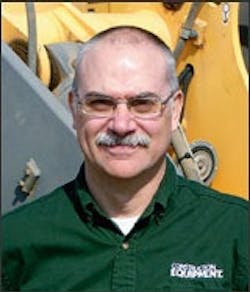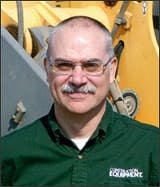Don't Be "Out-Moded"
Recognizing that many, although not all, manufacturers now offer various work modes on their machines, we asked Gene to operate a machine with four selectable work modes—two for digging, one for grading and the fourth for lifting—to gain a feeling for how these "smart" controls affect operations. When digging, he really didn't spend much time in "economy," instead keeping it in its full-power "standard" mode.
When we asked him about it, Gene told us he refuses to use work modes—even when grading or lifting—preferring to "feel" his work through the control levers. In fact, he trains operators to ignore the mode functions: Run it at full rpm and control the machine with your hands. This, he says, enables the operator to be most productive with the machine.
Selectable operating modes use electronics to manage hydraulic flow and engine rpm in an effort to tailor the machine to its task and enable operators to balance productivity with fuel economy. The reality may be, however, that experienced operators ignore the functions, much as Gene does.
Equipment managers blessed with seasoned operators need to understand this tendency as they manage their fleets. They must know how to balance productivity against fuel efficiency and machine life. They must test manufacturer claims against field results.
For managers not so blessed, work modes can make less-experienced operators productive quickly. Again, the fleet manager must know how the machines are operated in order to properly balance field performance with machine management.
The larger issue, however, faces the industry at large. As manufacturers, to their credit, make machines easier to operate, many users may fall back on this as an excuse not to train operators. This is a mistake we can't afford to make. Operators who understand how their machines are designed to work, and who can be exposed to the tutelage of an experienced operator such as Gene Held, will produce the most efficiently on the jobsite. It's too easy to become complacent; we must continue to push for high-quality training and expect nothing less than the best.
| Author Information |
| Rod Sutton, Editor in Chief, 630-288-8130, [email protected] |


